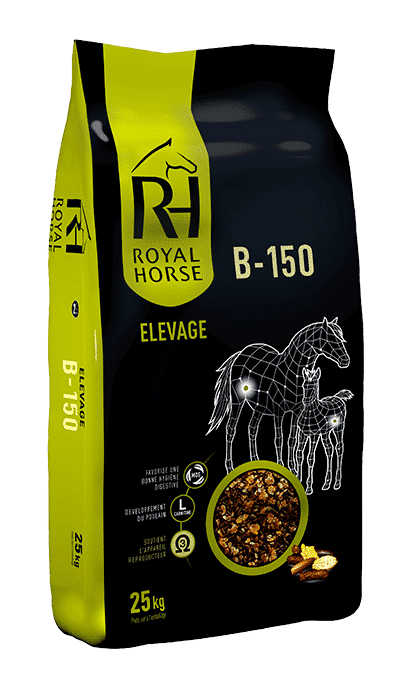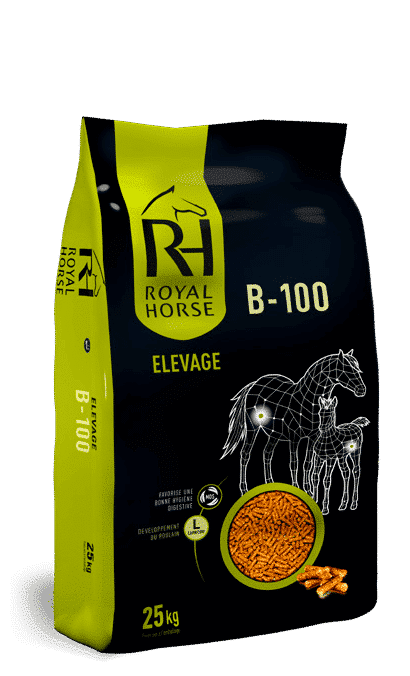BEFORE MATING: THE MARE’S DIET MUST ENSURE OPTIMAL FERTILITY AND PREGNANCY
The diet for horses is a complex subject, both because of their physiological differences and their degree of activity, and of course taking into account their environment. When it comes to foaling, it is essential to offer horse feeds and supplements that will suit both nursing mares and foals. The proper development of horses starts early. Before breeding, the quality of the feed will influence the fertility of the mare. If she is deficient or undernourished, it may decrease the likelihood of her becoming pregnant. Also, for the brood mare to give birth to a vigorous foal, her body condition before breeding is essential, she should not be too thin or too fat. Le surpoids peut empêcher le bon déroulement du poulinage et sa production de lait. Si elle est trop maigre, elle aura du mal à refaire ses réserves pendant la période de lactation. Her body condition should also be monitored throughout gestation. A feed adapted to breeding horses is to be preferred, such as Royal Horse B100 (in the form of pellets) or B150 (in the form of flakes). This range is specially designed for breeding horses and will ensure all their nutritional needs, whatever the phase of reproduction or gestation of a grass or forage based ration.
FROM MATING TO THE SEVENTH MONTH: THE BROODMARE’S DIET CHANGES LITTLE
The gestation period in horses is quite long, lasting about 11 months. During the first 7 months of gestation, the foal develops relatively slowly, reaching only 17% of its birth weight by the seventh month. For this reason, the foaling mare’s dietary needs are quite similar to those of a non-pregnant mare during this period. A balanced diet of horse feed can be more than sufficient, if the grass is rich and abundant (especially in the spring) and the hay is of good quality. Moreover, most of the matings are done between January and May for racing mares, and March and July for sport mares, the goal being that they can use the rich spring grass to get all the energy they need for gestation. However, it will be necessary to add CMV (Mineral and Vitamin Supplement), a salt stone and clean water at will. If the brood mare does not live in the meadow or has limited access to it, a diet based on pellets/flakes and forage should be preferred.
FROM THE SEVENTH MONTH TO BIRTH: THE BROODMARE’S DIET MUST BE ENRICHED
From the seventh month, the growth of the fetus accelerates strongly. The body mass of the pregnant mare will increase by 7% on average, i.e. about 45 kilos for a 550 kilo mare. The brood mare’s food requirements will therefore have to change accordingly, especially in terms of proteins. At the end of gestation, the foetus occupies a lot of space in the mare’s abdomen, making it more difficult to absorb large quantities of forage. It is therefore necessary to compensate and increase the ration with a food concentrated in energy, and containing the right amino acids, especially lysine, which helps the body to absorb calcium, which is essential for the development of the foal’s skeleton. These last months of gestation are crucial for foals because this is when the quality of their bones, muscles and gastrointestinal system are developed.
DURING LACTATION, THE BROODMARE’S DIET MUST REMAIN RICH
Lactation in the mare requires a great physiological effort, especially during the first 3 months after the birth of the foal. Her nutritional needs can almost double during the first 4 months of lactation, especially her protein needs. Its phosphorus and calcium needs can even triple! The foal’s nutritional needs will take priority over her own needs, so the mare will draw on her reserves in case of deficiency. In particular, she will need L-carnitine, an amino acid that the foal will need for its development, but that it cannot synthesize in sufficient quantities on its own. If the brood mare is fed with Royal Horse B-100 or Royal Horse B-150 feed, she will be able to transmit it to the foal via her milk. It will also give him all the essential vitamins and minerals to build his immune system.
AFTER LACTATION, THE DIET OF THE LACTATING MARE MAY DECREASE IN QUANTITY
To prepare for the dry period of the lactating mare and the weaning of her foal, her diet should be reduced to her maintenance ration. Her water intake should also be reduced. Physical separation is not always sufficient for dry-off, as some mares stop producing milk quickly and others need more time to do so.
OTHER NECESSARY CARE FOR PREGNANT AND LACTATING MARES
In addition to horse nutrition, other care must accompany the pregnancy of the brood mare. In particular, dental care is essential for pregnant mares to be able to properly assimilate their rations. Follow-up by an equine dentist should be done at least once a year. In addition, the pregnant mare must be followed up by a farrier so that she can be trimmed regularly. An osteopathic follow-up after the pregnancy of the mare can also be of interest, as some mares suffer from back pain or other pathologies following their pregnancies. Make sure that your brood mare is up to date with her vaccinations and deworming.





